#i'm starting to use more european english in my vocabulary though
Explore tagged Tumblr posts
Text
Esperanto in Metaphor: ReFantazio
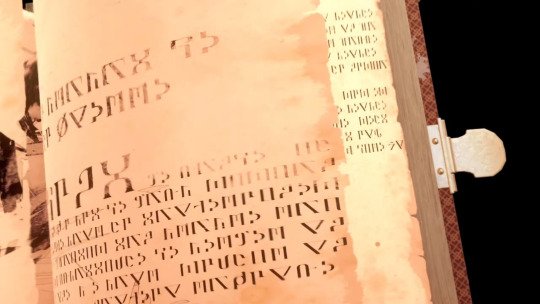
Not long ago I saw this this tweet pointing out that the in-game language in Metaphor is Esperanto (written in another script) and I decided to investigate for myself! The vocal tracks are in Esperanto as well, but I want to focus on the text here since I don't have a great ear for it. (The quoted tweet also points out that you can rearrange the title to get an Esperanto phrase - I think it would be more accurately spelled "Metafore Fantazio," or "metaphorically fantasy"!)
For the unfamiliar, Esperanto is the world's most widely spoken constructed language, developed in the late 19th century with the aim of being an easy to learn secondary language that could act as a bridge between speakers of other languages. While its vocabulary and grammar are largely derived from various European language families, it has speakers worldwide, including a sizeable number in Japan. Given the relationship between Metaphor's world and our own, I think it's a cool choice to take a constructed secondary language and make it the in-universe primary language—not to mention the game's themes of uniting different people with a language intended to do just that.
I studied Esperanto myself for some time 9 years ago, though I've forgotten most of it, so I'm very rusty. That said, I was able to sit down and parse one particular block of text that the game provides a translation for, and use that to read the rest! I'm slowly combing through the demo and translating any legible text, and I wanted to share some of the interesting details I found. If any Esperantists see this and want to weigh in, please do! There's plenty I may not remember or be aware of.
Continued under the cut, including content from the demo:

Let's start with the text the game translates for us! Here's what the VO/subtitles say:
O Great Seeker, bearer of fantasy empowered... Hear my wish, and come forth from thy epoch of glory to grant me thy guidance.
Here's the "deciphered" Esperanto:
Ho, granda serĉanto, kiu vivas en epoko de gloro, kiu enkarnigas la povon de fantazio. Bonvolu disdoni al li vian gvidadon.
And here's a more "direct" translation:
O Great Seeker, who lives in an epoch of glory, who embodies the power of fantasy. Please grant him thy guidance.
Not too much different of note here other than the pronoun usage—in Esperanto, the speaker explicitly uses "he," likely referring to the protagonist. I suspect that the English is actually translated from the Japanese line, which is ambiguous, so they made an educated guess here. But, since this is the same speaker who narrates awakening cutscenes and new bonds, it makes sense that they're calling to the Seeker on his behalf!
This is a point I'm unsure about, but from my understanding, "granda" (here translated as "great") typically refers to size, so it seems like an odd word choice to me—but it's possible there are connotations I'm not aware of.
After some poking around I stumbled across some text on the background of the name entry screen that reads "signaro" (character set), followed by the whole Latin alphabet on the next line.

"But Batts!" you may say. "Esperanto doesn't use QWXY! What about the diacritics!"
Well. There aren't any! There are 6 characters with diacritic marks used in Esperanto (ĉ, ĝ, ĥ, ĵ, ŝ, and ŭ), and since our character set doesn't use any of them, we have to make some educated guesses about which one it is at any given time. This is mostly a non-issue since they're real, existing words, but it does make it a bit trickier at points, and relates to another problem I'll get to in a bit. (There are a select few instances where I've seen diacritic marks on handwritten text or shop names, but there are still far fewer than there should be.)
That said, there is also some plain English text using this script as well, so the game does make use of those extra letters, such as the Memorandum UI - scrolling books have titles like "Marine," "Royal Capital," "100 Mystery of Ningen (humans)," and "Melancholia Gen" (?), plus cute notes in the background like "I want to read slowly" and "already read very good."

Anyway, this diacritic ambiguity bugged me for a bit when I started translating some text with "Euchronia" in it, like the above "Regno de Eŭcronio - Dezerto de Tradia." The Esperanto "C" and "Ĉ" are always pronounced "ts" and "ch" respectively, so the pronunciation here is a bit awkward either way, as both characters are meant to precede a vowel. A more natural pronunciation in line with both the Japanese and English would be "Eŭkronio," a spelling I found once in the body of the contract our protagonist signs to join the army, and never again. Alas.
I noticed a few interesting details while translating place names - the "Trad" in "Grand Trad" (Granda Tradicio) means "tradition" - and many locations are labeled on the map that I don't think are mentioned in the demo's runtime - Oceana to the west is named, but also of note are Kalendulo ("marigold," maybe "Calendula" in English) to the east, the Hulkenmont mountains surrounding that region, and the "Malnova Insularo" (old archipelago) to the south.
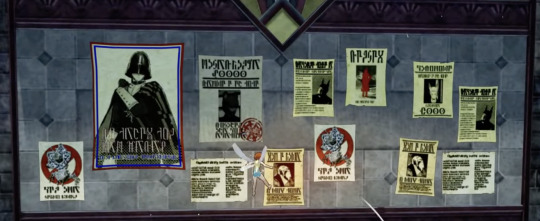
(Screenshot grabbed from justonegamr on Youtube.)
Lots of fun stuff going on with these posters - the big propaganda poster says "Mi volas vin por homoj" - "I want you for humans!" The poster immediately to its right and the one with the light-haired paripus are both wanted posters with rewards of 50,000 and 7,000 respectively, and the former has a somewhat legible name - Mikelan something (?). There's also quite a bit of illegible text that I'll need to boot up the game to stare at, textures willing.
Here is where I noticed an occasional problem with the text in this game: some of these posters include words that should have diacritic marks, but instead the characters are gone entirely or replaced with a space. For instance, the poster with the face that appears twice on the bottom row reads "Ser a peto - i tiu viro" where it should say "Serĉa peto - ĉi tiu viro" (Search request - this man). I spent so long wondering what "Dan ero" meant on the poster with the red "no" sign before I realized it was meant to be "Danĝero" (Danger).
This extends to some other parts of the game, such as the world map title ("Unuiĝinta Reĝlando de Eŭcronio" written as "unui inta re lando de e cronio," which is how I knew it was a plain C oops), and the giant statue in More's study covered in archetype names, some of which are missing characters.
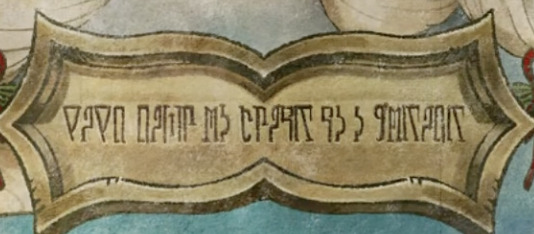
I suspect that at some point in the process, these characters couldn't be properly encoded and got lost before making it into the game. Most of the UI text seems to be intact, and this only affects graphic text as far as I've seen. Luckily, we can usually use context to guess at what they should be.
There's a ton more that I'm still hunting down and translating, so if you'd like to see it, you can check out my spreadsheet here! I'm hoping to keep updating it as I play through the full game, and I may make some more posts if I encounter any particularly interesting details. A few more tidbits before I go:
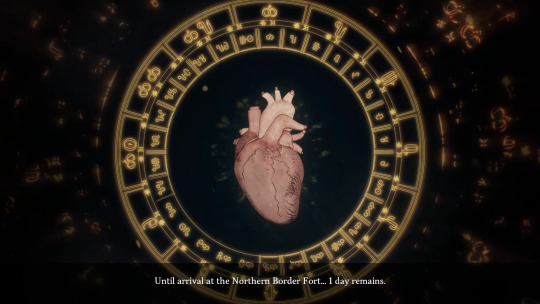
This appears to be an annual calendar - number 1 is at the top and it circles around to 12, and then the inner circle runs from 1-30, likely representing the weeks.
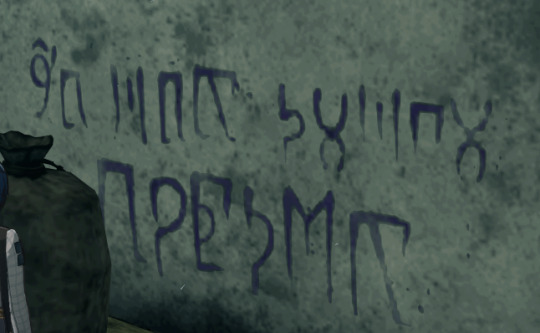
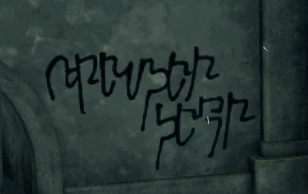
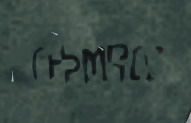
Various graffiti found around Sunshade Row that reads:
Ĉi tio estis infero (this was hell)
Malbela elda (nasty/ugly elda)
Merdo (shit)
And in the words of our favorite tooth...

Elbe venontfoje! (Maybe next time!)
#metaphor#metaphor refantazio#metaphor: refantazio#atlus#atlus games#esperanto#im so deep in the trenches dude i just went around inspecting all the shops and posters around the city#i cant wait to do this in every new location#personal#also i found some very teeny tiny placeholder text in romaji that says something about a hulkenberg image#best of
312 notes
·
View notes
Note
Good day, Will! Could you please tell how difficult it is for an actor to mimic different English accents (by "English accents" I mean, for example, Scottish, Irish, American, etc, accents of native English speakers)? What was the most difficult/easy accent you learnt, the accent you personally like? I am not a native English speaker, in my language we pronounce words almost as they are written, and dialects don't really differ drastically. English, on the other hand, seems to be a very flexible language phonetically concidering how many dialects and accents exist. PS Allow me to express my admiration by your talent. It is such a pleasure to listen to you sing and to listen characters in games voiced by you.
Good day to you!
It really depends from person to person - what your background is, how your brain works, etc - but for me I'd say it's a lot to do with exposure and references. I'd say that one of the reasons so many Europeans are good english speakers (as opposed to the generally appalling language skills of people in the UK) is that they are exposed to content in English.
For that reason, a generic US accent was one of the easiest for me to pick up when I was a kid. Partly through mimicry, living in foreign countries, learning languages, and singing, I got very good at knowing how to make all the weird noises I could with my mouth when I was a child, - looking back I'm not sure how it took so long for me to get diagnosed with ADHD...
As I got a bit older though, I started to focus more on specific references for accents - for instance I tend to start all my Northern accents somewhere around Sean Bean and then migrate to wherever I need to depending on the character. Inconsistency is the biggest giveaway (in my eyes) for bad accents - I can believe that anyone can talk in any way, but they're unlikely to change the rules halfway through a sentence if they've spoken that way their entire life!
Finally, when I trained as an actor I actually started to learn phonetics, which was kind of giving a vocabulary to the library of mouth-noises I was already familiar with, and combined with learning more about characterisation, movement & physicality, and vocal technique meant I had even more tools in my box.
Some accents I've tried a few times but never been happy with - Scouse, Geordie and Brummie are all very specific and I've never needed to really get to grips with them. My favourite accent changes a lot, but might be Welsh at the moment.
Something I always try and avoid is the accent I'm doing *becoming* the character. It's an easy trap to fall into when you're starting out - you do a valley girl accent and suddenly you're a generic valley girl, a West Country accent and you're a farmer. People are complicated, their character is way more than their accent... and nowadays I feel like you should treat each character as having their own accent unique to them - their ideolect.
To wrap up this much longer than expected reply, I'd say that my accent learning goes from mimicry->charicature->honing/specifying->ideolect.
18 notes
·
View notes
Text
Brazilian Portuguese learning resources: beginners like me
I've decided to compile all of the free resources I've found. Some of these are shared pdfs of textbooks, which may or may not be fair use or public domain, so keep that in mind. These are just a few.
Things I'm currently using, or plan to use very soon:
Jump Start Brazilian Portuguese with Professor Jason Jolley
This series uses slideshows and lecture to help guide learners through basic concepts. So far, the lessons have good notes to use and clear pronunciation, which makes hearing the sounds and mimicking the speaker a bit easier. I started this and dropped it previously due to my school workload at the time, but I decided to come back to it for aforementioned reasons.
Learn Portuguese - App.
This is a good resource for finding vocabulary by category and allows learners to do listening and reading practice. You can also go through any of the categories again for review. There are adds but they are generally short and not overly intrusive.
Duolingo Portuguese - App/Web Version.
This one is a huge doozy. It's controversial for its lack of grammar explanations, sometimes confusing or inaccurate pronunciation, its use of AI translations, and its lack of customization. However, it is a good supplemental material and uses a gamified lesson structure to help get a little bit of practice in on days where more in depth courses are unavailable or inaccessible.
Teach Yourself: Complete Brazilian Portuguese by Sue Tyson-Ward.
I have quite a few beginner textbooks that I'd like to use, as they all have their own method of teaching the language, the vocabulary and grammar they introduce first, and I think it will allow me to gain a better understanding as I have no in-person teacher at the moment. This one is a bit shorter and starts with questions and responses in a conversation setting. I have this as a pdf, so I have no access to the CD lessons.
Word Reference: English-to-Portuguese Dictionary
This one is a search-based dictionary. I do like that it shows various symbols to indicate the type of language and offers an example sentence. It's good for quick vocabulary but has no option to search with sentences, though offers some phrase searches.
I also have two children's workbooks: 50 Atividades para Alfabetização - Solange Moll Passos and Caderno de Atividades - Amélia Porto e Maria Luisa Aroeira.
To understand the language's history and development, I saved:
Brazilian Portuguese vs European Portuguese: A Comprehensive Guide
European vs Brazilian Portuguese - Includes Audio Examples
Spanish vs Portuguese: A Short Comparative Linguistic Tour
Interactive resources for reading, grammar, or vocabulary:
Read Brazilian Portuguese - Homepage *I have not tried this yet.
Brazilian Portuguese Learning Games - Digital Dialects *I have not tried this yet.
2 notes
·
View notes
Note
Hey there! I hope I'm not bothering you! I'm writing this story and I need advice on how to write Rolf. I saw your Ask Rolf account and you write him really well... any tips?
Not at all! ❤
First thing’s first:
1) It’s not necessary to tack on ‘‘yes’‘ and ‘‘no’‘ at the end of every sentence. Too many writers do this. XD
2) He’s totally allowed to break from third person when deemed appropriate. Rolf actually consciously speaks in third person, it’s not the language barrier at all. If anyone wants to revisit the first season, he always spoke in first person. He didn’t start speaking in third person till the second season because apparently it was not a character trait the writers adapted for him until much later (keep in mind, they were still figuring out the characters and all their quirks). We didn’t see enough of the secondary characters in Season 1 for them to fully form and become the fleshed out individuals we know and love from the later seasons. But yeah, re-watch ‘‘Oath to an Ed’‘ and you’ll notice Rolf never speaks in third person. Even after referring to himself in third person became his trademark idiosyncrasy (playing into the foreigner stereotype), he still knowingly breaks from it all the time. Mainly to exercise authority. Now doesn’t ‘‘Do as I say?’‘ carry more weight than ‘‘Do as Rolf say?’‘ Yeah, I think so too. :)
3) (I hate this word for personal reasons but for a lack of a better term) the ‘‘broken’‘ English is very mild, hardly noticeable (if that!). Try not to overdue it. Though he still obviously struggles with the language barrier, he’s a lot more fluent than people give him credit for. (Note: He’ll say ‘’This one is easy’’ not ‘’This one easy’’. Or a better example, “This empty roll must be replaced with a new one." Complete sentence. If it was terribly ‘’fractured’’ it would sound something like this: ‘’Empty roll must be replaced with new one.’’) I think it’s the thick accent that makes his speech sound more ‘’broken’’ than it actually is to the Western ear. Though sometimes his grammar is kinda weird, it’s not all that ‘’crippled’’. Sometimes I use the way I used to speak English for authenticity (usually I had trouble with contractions and would replace words like ‘’don’t’’, ‘’can’t’’, and ‘’won’t’’ with ‘’not’’. For example, instead of ‘’I don’t know’’ I used to say ‘’I not know’’). Which brings me to my next topic.
4) Bilingual skills! Eventhough he strains to pass his English class and other classes of challengingsubject matter, his bilingual skills verbally improve in Season 5. Where Rolf is shown tospeak mild ‘’broken’’ English in the first coupleseasons, he returns in Season 5 much more articulate than we remember him. Thoughhe still claims to find English complicated, and scores F’s on his Englishexams and homework, he’s also able to ramble the entirety of the Englishlanguage dictionary a la Double D. In other words, his vocabulary broadens fromjust country riddles to methodical flowery arrangements. Go figure. Rolf’sEnglish is actually very fluent, even though at times, he wrestles to find theproper words to express himself, but it seems he mainly has trouble withstructure and grammar, rather than a lack of comprehension for his secondlanguage. Though simple-minded phrases like ‘’Tony Baloney’’ and ‘’flatdoodle’’ are not obsolete from his day-to-day jargon, he’s adopted massive ‘’DoubleD’’ words like ‘’protuberance‘’ ‘’fortitude’’ and ‘’retribution’’ in hisspeech, and uses them in perfect context and pronunciation without missing abeat, never mind his thick Eastern European accent. He gains so much confidencein his newfound, increased cognitive abilities that he takes a risk and entersthe Spelling Bee in ‘’Too Smart for His Own Ed’’. Prior to the competition, aviolent panic attack seizes him, preventing him from spelling even a simpleword like ‘’watch’’, and during his turn, he chickens out due to a publicspeaking anxiety, but we have to give him credit where credit’s due.
He was so confident! Damn you stage fright!

Why does he look like he’s going to spitthe most fire verse of the century?
Ahem. Point is, don’t hold back from giving him big vocabulary. He’s actually not that simple-minded or, as Double D would say ‘’uneducated’’. Someone who took it upon himself to learn a foreign language can’t be all that dumb. Yes, he’ll still refer to raisins as ‘‘doohickeys’‘ but he knows what a wallet is. Keep him Old World but don’t make it sound like he was was raised by wolves and lived in a cave his whole life. He’s an immigrant, not an idiot. He’s crossed oceans on a canoe, he’s probably seen more of the world than any of the kids in Peach Creek who’ve never been father than their own backyards. He’s kinda wise beyond his years.
That being said, it’s totally realistic for him to still struggle with finding proper words and expressions to express himself. For instance, I’m MUCH better at English than I used to be but I still have my moments. Just recently, my American friend used the phrase ‘‘cracking up’‘ and I thought she was either a) angry or b) losing her mind. She proceeded to explain to me that in that particular context, she meant she was laughing really hard. Mind blown! I’m also still confused by some English idioms that don’t exist in my language. ‘‘Knock on wood’‘ is one of them. I still don’t get it, no matter how many times my friend explained it to me. There was also a funny instance I had a long time ago. In my country, we have a saying that describes someone who’s named after someone or something famous. Like, if your name is Fanibhusan, named after Lord Shiva, we call that something… and I was having major difficulty finding the English equivalent to that. I originally used the word ‘‘trivial’‘ having no idea what ‘‘trivial’‘ actually meant. It only sounded right to me because I associated ‘‘trivial’‘ with the word ‘‘trivia’‘ but my friend said that wasn’t right, because that actually meant the opposite of what I thought it meant, which is ‘’of little value or importance’’. So we spent a good deal trying to figure out what I was trying to say, but in the end, my friend broke the news to me that there was no such thing in the American English language. Sooooooooo bilingual people, even half fluent ones like me, are still going to have those moments. Sometimes you’re going to have that constant translating in your head… although when I’m speaking English to my English speaking friends, I tend to think in English, if that makes sense. XD
5) Immigration! Everyone’s favourite subject. Welp, it’s much appreciated when fanfiction writers don’t totally ignore his status. It shapes him as the person he is. However, you don’t have to dwell on it either. Don’t confine him to a label. He’s a person first, immigrant second. Make it known he likes basketball and candied beets before you let ‘’immigrant’’ define him, because then that just clumps him into the image of a faceless mixture of brown people hopping fences and negative stereotypes. Let him be a proud Son of a Shepherd first and foremost. Let him be happy and carefree, because this kind of representation is just as important as any social issue. He doesn’t have to be a sob story to make me feel represented. Rolf’s prone to heartbreak, and he does get homesick, and it’s very important to realise the challenges and culture barriers he faces, but he’s also upbeat and positive. It’s important to have that balance of both real struggles coupled with childhood nostalgia.
6) Most importantly, have fun! Go nuts!
52 notes
·
View notes
Note
When someone compliments me because I'm a bilingual writer, I'm like, no? I wish my English was so good that I **wouldn't have to switch to my native language** to express complex thoughts. It's not a plus! It's a weakness! Some of the most loved people in my fandom are Europeans who speak English like a native. My ship means the world to me. But I'll never be one of the really good writers. How do I cope with that? (Seriously thought about getting an American tutor? Just too expensive, though.)
Oh darling. No no no no no. You listen to me:
You. Will. Learn.
Trust the words of another non-native speaker! You will learn! Learning a language, especially writing, takes time, effort, and most of all practice. You’re now at a level where you notice differences in fluency and have a feeling for what sounds “native” and what doesn’t; but you’re not able to pull it off yourself yet. It’s a frustrating stage, (and a familiar one), but it will pass. I swear!
The remedies: read in English. Watch shows in English. Speak English. Write in English. Soak yourself in that language until you perspire it. When you encounter a word you don’t know, look it up, check how it’s pronounced, research how it’s used in a sentence. When you notice a sentence that is flowing beautifully, take a short moment to understand why. Same thing when a sentence doesn’t read nice.Find yourself good translation sites. That’s a good way to expand your vocabulary and to improve your sentences’ construction.
Dude, it’s completely normal not to be able to express complex thoughts in a foreign language. You seem not to acknowledge how difficult it is to speak multiple languages, and to be able to switch back and forth. Of course many other people can do it to, but it’s still hard! Accept the praise from your readers - it’s deserved. It takes a lot of effort to write in a foreign language.
Also, there are good chances those other Europeans you mentioned are older than you, or maybe they’ve spend years abroad, or maybe they are just more gifted with languages - who knows? And who cares. It doesn’t matter, because you don’t need to compare yourself to them. I know it’s easy to say, and hard to do, but don’t compare yourself to others. You don’t know their circumstances, their struggles, and chances are good they started at the exact same point where you are know.
So keep practicing, keep improving and growing, and I’m 100% confident you’ll be able to fool every reader into thinking you’ve never spoken another language than english. Maybe not tomorrow, maybe not in a month, but in one year or two? Yup. Until then you gotta be patient and work hard. But you’ll get there, I swear.
(P.S. pro tip: to gain a better understanding for why your writing doesn’t sound “native”, read aloud - your work and others. It helps get you a feeling for the rhythm of sentences and for what works or not)
30 notes
·
View notes